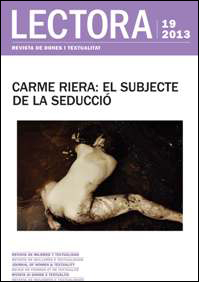Verena's Innocence: The Dispute Over the Control of the Voice in Henry James' <em>The Bostonians</em>
Keywords:
Henry James, The Bostonians, Verena Tarrant, voice, desire, identityAbstract
Henry James' The Bostonians is one of those literary works whose nature tends towards ambiguity and resistance to reductionist interpretations. Today, the gender studies' perspective allows us to surpass such interpretations, and to access the text's core —what holds it together— so as to explain its primary opacities. Thus, the first part of this article is dedicated to the analysis of the story's main character, Verena, as a figure void of the extraordinary and trapped in an unending number of ideological discourses which, in turn, shape her as a constructed identity. Consequently, Verena's self is left silenced; paradoxically, her voice, her gift, is exclusively used to communicate the wishes projected by other characters. The second part of the article, which moves from the private to the public sphere, is an attempt to allegorically interpret Verena and the dynamics of desire which surround her. This second level of analysis will facilitate a reading of the text as less ambiguous, offering an interpretative key based on the notion of character as the spokesperson of a given ideology or set of values. Finally, the article concludes with James' vision of a dystopic society, hesitant between two ideological alternatives which are far from justifying the reality to which they refer.Downloads
How to Cite
Issue
Section
License
The Author retains ownership of the copyright in this article and grants Lectora: revista de dones i textualitat the rights to print publication of the Article. The work will be available under a Creative Commons Attribution-Noncommercial-No Derivative Works license, by which the article must be credited to the Author and the Journal be credited as first place of publication.
The Author is free to enter in seperate, additional contractual agreements for the non-exclusive distribution of the work as published in this journal (such as institutional repositories or a book), as long as the original publication in Lectora is credited.
The Author is encouraged to post the work online (eg in institutional or thematic repositories, or in their website), as it can lead to productive exchanges as well as to a greater citation of the published work (see The Effect of Open Access).




